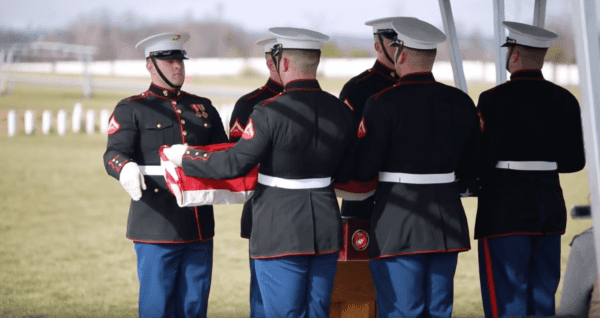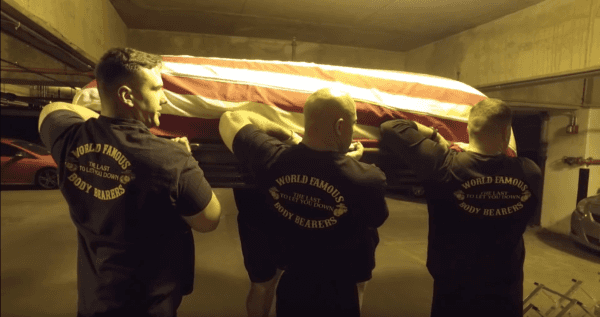A Marine funeral is one of the most chilling and patriotic sights to behold. Friends, families and fellow servicemen gather to pay tribute to an individual who dedicated his or her life to protecting the freedoms of this great country. And when that individual is finally laid to rest, he or she is carried to a final resting place by a highly trained, select group of Marines who deliver a breathtaking performance to properly honor their fellow patriot.
A video from the United States Marine Corps offers a glimpse at the specialized training of these men, and showcases what it’s like to be part of the most elite unit in the military.

Marine Corps Body Bearers practice for a funeral at Marine Barracks, Washington. (Marines/YouTube)
“A lot of people don’t really know what we do or don’t really know what it entails,” says Lance Cpl. Jamen Miller in the video. “And when they find out, they’re taken back a little bit.”
Miller is one of just 15 body bearers in the Marines whose job consists of bearing the casket of those who served. The specialized group of men train multiple times a day in order to perform flawlessly for each and every funeral they are apart of.
In the year that Miller has been a body bearer, he has already laid to rest nearly 200 Marines.

Marine Corps Body Bearers during a funeral. (Marines/YouTube)
“It’s our job to have flawless bearing and to perform our job at the max, at 100 percent for them,” Miller explains. “We don’t do it thinking about ourselves. It’s all for the family and for that American hero.”
Watch the video in full below:
In order to become a body bearer, a person must have certain physical attributes and meet extensive strength requirements. If selected, the Marine will then be subject to a rigorous training schedule. It can take between six months and a year to be fully qualified body bearer.
“We’re working on them getting their strength up, their core, their bearing,” Miller says in regards to the training. “What we’re also working on is their technique on carrying, and doing the various funerals that we do.”
Body bearers are expected to show no pain, no emotion and no sign of physical exertion. They breathe through their nose, must keep a straight face and, most importantly, they perform the duty in perfect harmony.
“It’s all about the family. You don’t want them to see anything other than a flawless funeral,” Miller says.

Marine Corps Body Bearers practice for a funeral at Marine Barracks, Washington. (Marines/YouTube)
While most of the funerals Miller has been a part of during his time have been for older Marines who have died of natural causes, Miller says that he has been a body bearer for Marines killed in combat. Those are particularly difficult, but Miller says that this is a job he loves.
“For me, honestly, I love it. It’s a hard job. It’s not for everyone. But it’s something I take a lot of pride in, and I know everybody else in this section does.”





